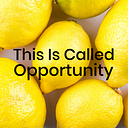Making Authentic Decisions
Always remember who you are and never become a victim of your circumstances.
Making decisions can be difficult. Particularly when everyone around you wants to weigh in and tell you what they think is best for you. You can be swayed by the opinions of others but what’s most important is to stay true to yourself. A big part of living a life of happiness is to never regret not doing something you had the opportunity to do.
If what you decided doesn’t correlate with the advice of the person you shared the information with it doesn’t mean that it is wrong. It just means that two individual people have different perceptions of the same situation. Consider the thoughts of those whose opinions you value the most but also recognise that they may have a bias. Having emotional competency means making the right choice, not the easy choice.
Be your authentic self and let your intuition guide you. Tune into your body and allow your mind to direct you to what feels best for you. If something feels ‘off’, then it most likely is. If someones advice leaves you with a headache and an upset stomach, rather than feeling relieved and ‘lighter’ than it may not be feedback that is true to you. If your body is experiencing negative sensations that means something is not sitting well with it. Or if something makes you smile, makes you feel free and excited then at that stage in your life it is probably a good decision for you. Always be genuine and sincere with yourself.
Particularly for people who are in-tune with their intuition and body, it can feel overwhelming to have physical and psychological reactions when making personal choices. But this is all goes back to the Brain-Gut connection. The gut is often referred to as ‘the second brain’ and that’s why the stress response by the gut can feel so powerful. We’ve all experienced it! It’s the massive knot in our stomach when we find out bad news or the butterflies in our stomach when we are nervous to meet a date for the first time.
As much experience and knowledge someone else whether that be mentor, friend or family member may have no one knows you as much as you know yourself. Of course, take into consideration what they may be saying and try to see things from their perspective but also ask, ‘what’s in it for them to try and sway me away from what I have expressed interest in?’ Explore the bias they may have and take into consideration their life experience and how that can influence how they perceive a situation.
It can be hard to reject the opinion of someone you trust, especially if you are a people-pleaser and don’t want to disappoint those you respect and look up to. But part of that relationship is to acknowledge their viewpoint, take on the advice that is applicable to you, and part ways with the things that do not serve you. At the end of the day, the other person needs to recognise that you will do what you believe is best for you. Perhaps in hindsight, they will be right, but you never know until you try it for yourself. It is all about having the emotional maturity to express your truth in a respectful way.
An authentic decision means just that. A choice that is sincere, genuine and true to who you are as an individual.
